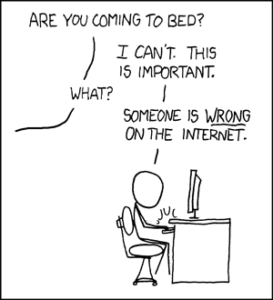I’ve been blogging at lydiaschoch.com for almost eighteen months now. Since I imported all of my old posts over from my previous site, the archives here begin in July of 2010 instead of November of 2016. I’ve been blogging much longer than that, though!
Over the past fifteen years, I’ve had several different blogs. With the exception of PK Stories, none of them still exist to the best of my knowledge, but I’ve still carried the lessons I learned from them forward to my current online home.
Today I thought it would be fun to list fifteen of the things I’ve learned about blogging over the last decade and a half.
1. Never post anything you’d be embarrassed to see plastered on a billboard in front of your home.
This really should go without saying, but I think some people forget just how long a blog post can be passed around online. I’ve shared and I’ve also seen others share thought-provoking posts that are several years old because the information in them is timeless. In a few cases, I’ve seen posts much older than that continue to circulate.
You never know when something might go viral, so I try to always be careful about what I say and how I say it.
 2. Ignore the trolls.
2. Ignore the trolls.
Arguing with them never helps in any way from what I’ve observed. The best way I’ve found to encourage them to permanently lose interest in you is to refuse to engage with them at all.
They generally seem to feel bored by the lack of conflict after a while and will wander away on their own accord once they realize that they won’t be getting a response.
Luckily, the vast majority of the people I meet online are friendly and don’t behave this way at all.
3. Don’t use pop-ups.
Pop-up ads or messages are intrusive, annoying, and counter-productive. I automatically leave sites who obstruct my view with pop-ups, and I don’t return to them in the future.
4. Share other people’s work liberally.
Every time I discover a new blog that I plan to start following, I set aside some time to read through their archives after I’ve added that site to my RSS feed. If I love their current posts, chances are excellent that I’ll adore their old stuff, too.
As I browse through their older material, I take note of the entries that were most appealing to me. Those posts are then either added to my Suggestion Saturday lists or tweeted by me at some point in the future. Most of the latter end up being included in the #MondayBlogs hashtag on Twitter due to how popular it is.
Since I enjoyed those posts, folks who follow me might really like them as well.
5. Don’t worry about reciprocation.
When I promote other people’s work, I do it with zero expectations of them returning the favour. There’s no imaginary scorecard in my head or anything like that. While I deeply appreciate everyone who shares links to my posts, I think of those responses as a happy bonus to something I already find rewarding.
I believe in sharing the things that bring me joy with the hope that others will find them just as entertaining.
6. Blogging isn’t a competition.
There’s plenty of room for everyone to shine. In fact, I’ve only seen better opportunities emerge for networking and promotion as more and more bloggers are connecting and collaborating with each other. Think of it as a group of people using cooperation to reach their goals instead of as a competition.
 7. It’s smarter to focus on a handful of topics than to write about everything.
7. It’s smarter to focus on a handful of topics than to write about everything.
In a couple of my previous sites, I blogged about whatever was on my mind on any particular day. I’ve found that it’s much easier for me to think of new things to write about and attract readers if I focused on a handful of topics and explored them deeply instead.
8. Be genuine.
No matter who you are or what you’re into, there are people out there who will connect with your interests, passions, and hobbies. I believe in regularly talking about whatever it is that makes your heart skip a beat without worrying about how popular or SEO-friendly it is.
9. Protect your privacy and the privacy of your loved ones.
There are certain things that just shouldn’t be shared openly online. For example, I shudder when I see buddies publicly sharing details of their itinerary for an upcoming vacation.
I don’t discuss stuff like future plans for safety reasons. If I’m going on a trip, I’ll save any amusing photos and stories about it for after I return home. Talking about it before or as it happens only gives potential burglars or other people who may have nefarious intentions advanced warning that my home will be empty for that period of time or that I’ll be in a specific place at X time.
10. Write down ideas for future posts.
As soon as I get a new idea for a future blog post, I jot it down in a file I created specifically for this purpose. This is something I do even if the idea is partially developed or I’m not sure if I want to use it at all. If only all of you knew how many times I forgot ideas before I started making myself write down all of them!
Some of these ideas have been sitting there for months, and a few of them are years old. Eventually, I do hope to write about all of them when the time is right. For now they remain safely tucked away in my list until I need some inspiration for an upcoming post. 
11. Use recommendations from your readers as writing fodder.
Every once in a while, one of my favourite bloggers decides to write a follow-up post to a question or comment I or someone else had about something they wrote. There have also been a few times when I’ve gotten blog ideas from people’s comments on my own site.
It’s thrilling every time that happens. I only wish it happened more!
12. Allow comments, but do moderate them.
I filter out all of the spam comments on my site. In the distant past when I had a troll or two lurking around, I immediately deleted their messages as well.
Other than that, I tend to allow just about any sort of comment slip through. I respond to them, too.
13. Leave thoughtful comments on other sites.
Speaking of comments, I’m so glad I got into the habit of responding to other people’s posts. Sometimes the comment section is honestly just as interesting as the original article because of the high quality comments that are left by fans and the site owner. April Munday’s blog is one of the many examples of how beautifully this system can work.

14. Build relationships.
I’ve made several good friends through my years of blogging who are still part of my life to this day, and I’ve gotten to know many other people through this activity as well. If you’re open to it, this is a fantastic way to build a supportive community of likeminded friends who live all over the world.
15. Have fun!
Blogging is a deeply rewarding experience that has improved my life in more ways than I can count. I hope that every blogger finds the same happiness from crafting their posts and sharing them with the world.
What have you learned from blogging?
 Before I dive into today’s topic, I’d like to make this clear that this post was written as a gentle nudge for people who’d have the time and energy to dedicate to blogging if they knew about the individual and societal benefits of doing such a thing
Before I dive into today’s topic, I’d like to make this clear that this post was written as a gentle nudge for people who’d have the time and energy to dedicate to blogging if they knew about the individual and societal benefits of doing such a thing
 No, this isn’t my way of saying that I’m taking a break from blogging. I’ve done it once or twice in the past for various reasons, but I have no current plans to ever do it again.
No, this isn’t my way of saying that I’m taking a break from blogging. I’ve done it once or twice in the past for various reasons, but I have no current plans to ever do it again. I do have one request for friends who find themselves needing to pull back from their regular posting schedules. If possible, I’d love to see some sort of message from them saying that they’ll be gone for a while. You don’t have to say why you’re leaving if you’d prefer not to (although I’d love to know if it’s due to something that might change again in the future if you don’t mind giving out enough details for this question to be answered).
I do have one request for friends who find themselves needing to pull back from their regular posting schedules. If possible, I’d love to see some sort of message from them saying that they’ll be gone for a while. You don’t have to say why you’re leaving if you’d prefer not to (although I’d love to know if it’s due to something that might change again in the future if you don’t mind giving out enough details for this question to be answered).

 A person wearing contact lenses that makes their eyes glow and makeup that gives their skin a blue, purple, and red hue.
A person wearing contact lenses that makes their eyes glow and makeup that gives their skin a blue, purple, and red hue. 






 Does anyone else find that their taste in movies is constantly evolving? Even when it comes to films I know I’m going to want to watch eventually, I still need to be in the right mood for certain genres. Sometimes I might be more interested in a documentary or comedy. On other days, something dark and serious is right my alley.
Does anyone else find that their taste in movies is constantly evolving? Even when it comes to films I know I’m going to want to watch eventually, I still need to be in the right mood for certain genres. Sometimes I might be more interested in a documentary or comedy. On other days, something dark and serious is right my alley. When I write reviews for my own site, I focus on as many positive aspects of the films and books I talk about as I can think of. I believe in pointing out everything the creator did right, especially if it’s stuff that doesn’t seem to be mentioned too often by many other reviewers. Anything worth reviewing – much less watching in the first place – will have strong points.
When I write reviews for my own site, I focus on as many positive aspects of the films and books I talk about as I can think of. I believe in pointing out everything the creator did right, especially if it’s stuff that doesn’t seem to be mentioned too often by many other reviewers. Anything worth reviewing – much less watching in the first place – will have strong points. Just because I might not personally be interested in a film that spends a great deal of time on a certain theme or topic doesn’t mean that everyone I know feels the same way.
Just because I might not personally be interested in a film that spends a great deal of time on a certain theme or topic doesn’t mean that everyone I know feels the same way. 2. Ignore the trolls.
2. Ignore the trolls. 7. It’s smarter to focus on a handful of topics than to write about everything.
7. It’s smarter to focus on a handful of topics than to write about everything. 


 Getting to know the other Saturday Seven bloggers nudged me firmly in the direction of opening up comments on this site again. They were all so friendly and interested in reading what everyone wrote every week. I probably wouldn’t have changed my mind on this issue if not for their friendship, gentle encouragement, and complete disinterest in ever arguing over what colour the sky is! LOL.
Getting to know the other Saturday Seven bloggers nudged me firmly in the direction of opening up comments on this site again. They were all so friendly and interested in reading what everyone wrote every week. I probably wouldn’t have changed my mind on this issue if not for their friendship, gentle encouragement, and complete disinterest in ever arguing over what colour the sky is! LOL. This is a question that is best answered by every blogger him or herself. I don’t blog about controversial topics, and my site hasn’t grown large enough to attract people who like to argue about everything on the Internet yet.
This is a question that is best answered by every blogger him or herself. I don’t blog about controversial topics, and my site hasn’t grown large enough to attract people who like to argue about everything on the Internet yet. The other day I learned something surprising about bananas.
The other day I learned something surprising about bananas. True stories like this one are why I think creative writers – especially those in the speculative fiction genre who are often responsible for creating worlds that are very different from the one we live in – should read books about what life was like decades, centuries, and millennia before they were born.
True stories like this one are why I think creative writers – especially those in the speculative fiction genre who are often responsible for creating worlds that are very different from the one we live in – should read books about what life was like decades, centuries, and millennia before they were born. Let’s shift gears and talk about Stonehenge for a moment. When compared to what we know about World War Two (and bananas), our knowledge so far of what purpose Stonehenge was meant to fill, who created it, and why they went through all of the trouble of making it could fit into a thimble.
Let’s shift gears and talk about Stonehenge for a moment. When compared to what we know about World War Two (and bananas), our knowledge so far of what purpose Stonehenge was meant to fill, who created it, and why they went through all of the trouble of making it could fit into a thimble.










 A few of you are probably wondering if you’re actually in one of those rare paranormal stories that involves a completely harmless spirit. The fact that you read this far means this is extremely unlikely to be true. Even the most mischievous ghost who had a truly friendly nature would stop immediately and reveal their identity if they frightened someone. It’s only a joke if everyone is laughing along!
A few of you are probably wondering if you’re actually in one of those rare paranormal stories that involves a completely harmless spirit. The fact that you read this far means this is extremely unlikely to be true. Even the most mischievous ghost who had a truly friendly nature would stop immediately and reveal their identity if they frightened someone. It’s only a joke if everyone is laughing along! Long and Short Reviews receives more requests for reviews than it’s current pool of reviewers can read.
Long and Short Reviews receives more requests for reviews than it’s current pool of reviewers can read. One of the biggest reasons why I like Long and Short Reviews is their policy of only posting honest, snark-free reviews.
One of the biggest reasons why I like Long and Short Reviews is their policy of only posting honest, snark-free reviews. As I alluded to above, writing reviews are one of the best ways to support authors. I have a wide circle of friends who are writers, and many of them talk about the difficulties of finding potential fans out there.
As I alluded to above, writing reviews are one of the best ways to support authors. I have a wide circle of friends who are writers, and many of them talk about the difficulties of finding potential fans out there. The comment sections of the reviews and blog posts on Long and Short Reviews are a wonderful place to browse if you have some free time this week.
The comment sections of the reviews and blog posts on Long and Short Reviews are a wonderful place to browse if you have some free time this week.